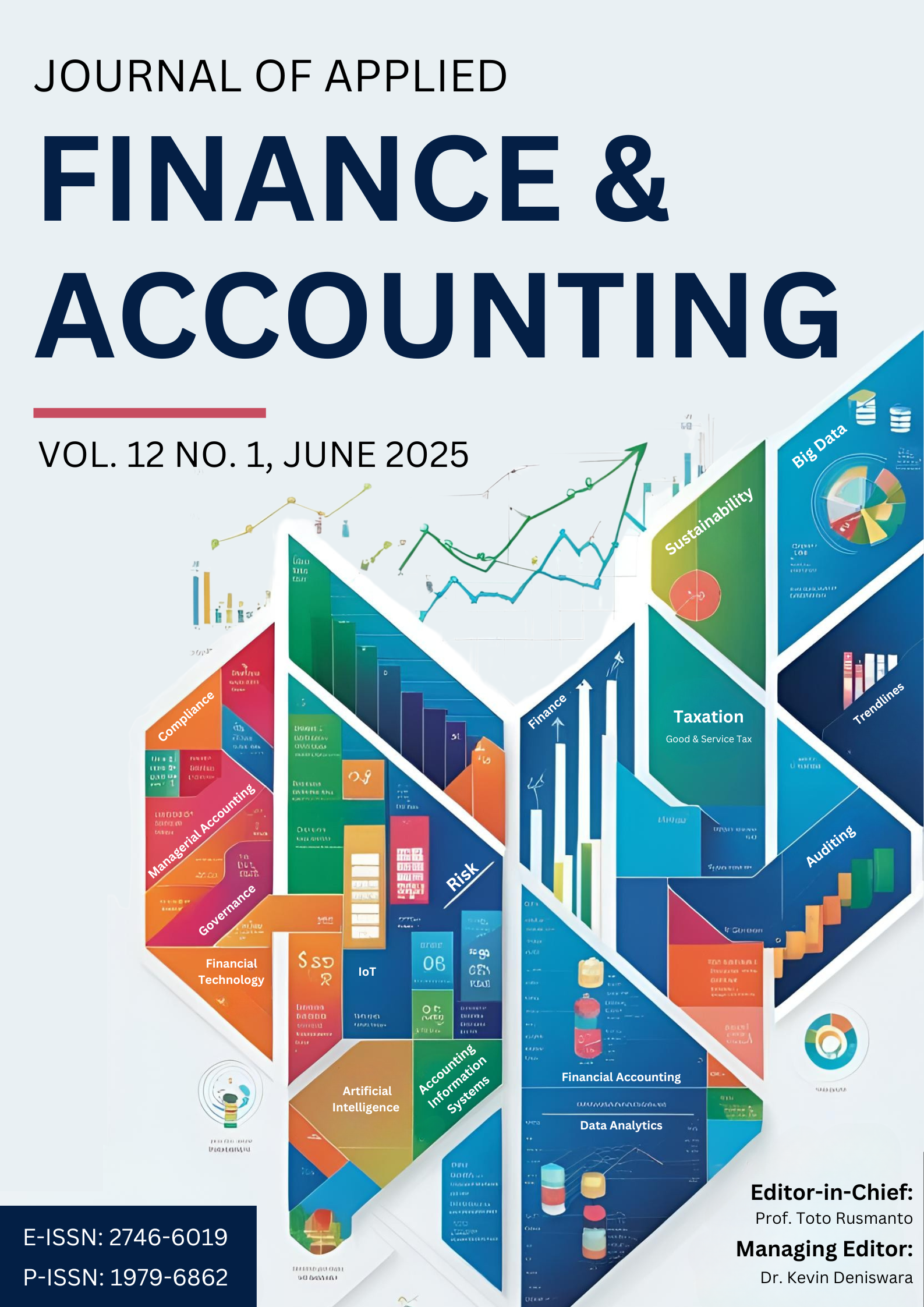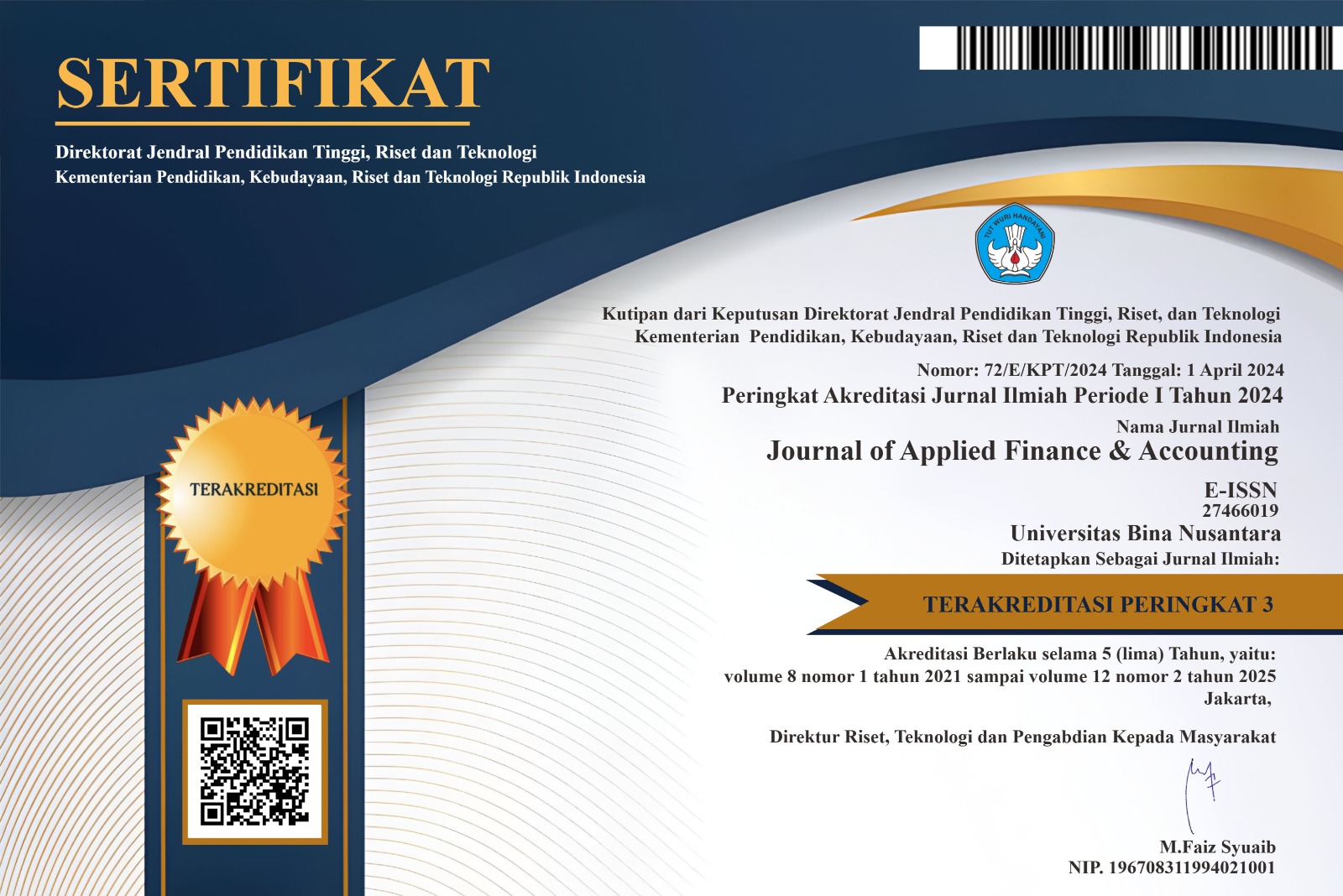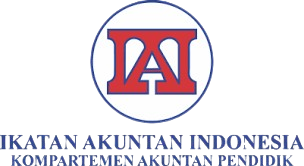INTEGRATION OF NYADRAN VALUES IN SUSTAINABILITY ACCOUNTING BASED ON BARBOUR PERSPECTIVE
DOI:
https://doi.org/10.21512/jafa.v12i1.12946Keywords:
Nyadran, Accounting, Barbour’s perspective, IntegrationAbstract
The Nyadran tradition, a Javanese cultural practice rooted in religious and spiritual values, serves as a metaphorical lens to expand the sustainability accounting paradigm. Using Ian G. Barbour's four perspectives framework—conflict, independence, dialogue, and integration—this study adopts a literature review approach to Nyadran analyse how the Nyadran tradition can enrich sustainability accounting. The findings reveal that Nyadran embodies core values such as ecological harmony, social responsibility, and respect for nature, which resonate deeply with the principles of sustainability. The dialogue and integration perspectives play a pivotal role in bridging the apparent gap between the spiritual essence of Nyadran and the quantitative, data-driven nature of sustainability accounting. Narratives embedded within the Nyadran tradition offer profound insights into sustainability practices, adding depth and meaning to sustainability reporting. In turn, sustainability accounting frameworks can empirically highlight the positive impacts of Nyadran cultural practices on environmental and social well-being. The implications of this research extend beyond traditional paradigms, advocating for the inclusion of moral and spiritual dimensions in sustainability accounting. By integrating Nyadran values, the framework adopts a more holistic approach, emphasising not only environmental and economic aspects but also ethical and spiritual considerations. The study’s novelty lies in its innovative combination of cultural narratives with sustainability accounting, paving the way for a more inclusive and meaningful understanding of sustainability in diverse cultural contexts.
References
Al-Hazaima, H., Alshurafat, H., Al Shbail, M. O., & Ananzeh, H. (2024). Stakeholders’ perceptions of sustainability accounting education: A literature review. In Technological Innovations for Business, Education and Sustainability (pp. 79–89). Emerald Publishing. https://doi.org/10.1108/978-1-83753-106-620241006
Albán, M. T. M. (2018). Management accounting strategies applied to smes literary review. Revista Lasallista de Investigacion, 15(2), 256–270. https://doi.org/10.22507/RLI.V15N2A20
Bigliardi, S. (2012). Barbour’s typologies and the contemporary debate on islam and science. Zygon, 47(3), 501–519. https://doi.org/10.1111/j.1467-9744.2012.01269.x
Bremer, S., & Funtowicz, S. (2015). Negotiating a place for sustainability science: Narratives from the Waikaraka Estuary in New Zealand. Environmental Science and Policy, 53, 47–59. https://doi.org/10.1016/j.envsci.2014.11.006
Browning, D. S. (2011). Reviving christian humanism: Science and religion. Zygon, 46(3), 673–685. https://doi.org/10.1111/j.1467-9744.2011.01205.x
Bsoul, L., Omer, A., Kucukalic, L., & Archbold, R. H. (2022). Islam’s Perspective on Environmental Sustainability: A Conceptual Analysis. Social Sciences, 11(6). https://doi.org/10.3390/socsci11060228
Cerovac, K. (2019). A Transdisciplinary approach to the consideration of the relationship between natural science and theology. Obnovljeni Zivot, 74(3), 399–412. https://doi.org/10.31337/oz.74.3.8
Christ, K. L., & Burritt, R. L. (2013). Environmental management accounting: The significance of contingent variables for adoption. Journal of Cleaner Production, 41, 163–173. https://doi.org/10.1016/j.jclepro.2012.10.007
Damper, R. I. (2024). Science and Religion in Conflict, Part 1: Preliminaries. Foundations of Science, 29(3), 587–624. https://doi.org/10.1007/s10699-022-09870-0
Dhiman, S. (2016). The case for eco-spirituality: Everybody can do something. In Spirituality and Sustainability: New Horizons and Exemplary Approaches (pp. 1–16). Springer International Publishing. https://doi.org/10.1007/978-3-319-34235-1_1
Fagerström, A., Hartwig, F., & Cunningham, G. (2017). Accounting and Auditing of Sustainability: Sustainable Indicator Accounting (SIA). Sustainability (United States), 10(1), 45–52. https://doi.org/10.1089/sus.2017.29080.af
Galaz, V., Centeno, M. A., Callahan, P. W., Causevic, A., Patterson, T., Brass, I., Baum, S., Farber, D., Fischer, J., Garcia, D., McPhearson, T., Jimenez, D., King, B., Larcey, P., & Levy, K. (2021). Artificial intelligence, systemic risks, and sustainability. Technology in Society, 67. https://doi.org/10.1016/j.techsoc.2021.101741
Gale, R. (2006). Environmental management accounting as a reflexive modernization strategy in cleaner production. Journal of Cleaner Production, 14(14), 1228–1236. https://doi.org/10.1016/j.jclepro.2005.08.008
Geria, I. M., Nastiti, T. S., Handini, R., Sujarwo, W., Dwijendra, A., Fauzi, M. R., & Juliawati, N. P. E. (2023). Built environment from the ancient Bali: The Balinese heritage for sustainable water management. Heliyon, 9(11). https://doi.org/10.1016/j.heliyon.2023.e21248
Hasan, N., Taufiq, M., Hannan, A., & Enhas, M. I. G. (2023). Tradition, Social Values, and Fiqh of Civilization: Examining the Nyadran Ritual in Nganjuk, East Java, Indonesia. Samarah, 7(3), 1778–1802. https://doi.org/10.22373/sjhk.v7i3.20578
Herath, S. K., & Herath, L. M. (2024). Accounting for Sustainability. In Contemporary Research and Practices for Promoting Financial Literacy and Sustainability (pp. 50–91). IGI Global. https://doi.org/10.4018/979-8-3693-0863-9.ch003
Hilmi, H. S., Andayani, & Wardani, N. E. (2024). Ecological Wisdom in the Legend of Otak Aiq Tojang: An Ecocritical Analysis. Studies in English Language and Education, 11(2), 1193–1212. https://doi.org/10.24815/siele.v11i2.35428
Imran, M. H. (2024). Religious philosophies and environmental ethics. In Religious Philosophies and Environmental Ethics. Bentham Science Publishers. https://doi.org/10.2174/97898152748201240101
Ives, C. D., & Kidwell, J. (2019). Religion and social values for sustainability. Sustainability Science, 14(5), 1355–1362. https://doi.org/10.1007/s11625-019-00657-0
Jaakkola, E. (2020). Designing conceptual articles: four approaches. AMS Review, 10(1–2), 18–26. https://doi.org/10.1007/s13162-020-00161-0
Jones, M. J. (2010). Accounting for the environment: Towards a theoretical perspective for environmental accounting and reporting. Accounting Forum, 34(2), 123–138. https://doi.org/10.1016/j.accfor.2010.03.001
Kakoty, S. (2018). Ecology, sustainability and traditional wisdom. Journal of Cleaner Production, 172, 3215–3224. https://doi.org/10.1016/j.jclepro.2017.11.036
Karyada, I. P. F. (2024). Paradigma Nusantara Dalam Masa Depan Akuntansi. Jurnal Akuntansi Multiparadigma, 15(1), 190–204. https://doi.org/10.21776/ub.jamal.2024.15.1.14
Koutsouris, A. (2010). Transdisciplinarity and participatory development: A critical realist approach. International Journal of Interdisciplinary Social Sciences, 5(4), 253–264. https://doi.org/10.18848/1833-1882/CGP/v05i04/51689
Losch, A. (2022). Constructive-critical realism as a philosophy of science and religion. HTS Teologiese Studies / Theological Studies, 78(2). https://doi.org/10.4102/HTS.V78I2.7742
Maas, K., Schaltegger, S., & Crutzen, N. (2016). Integrating corporate sustainability assessment, management accounting, control, and reporting. Journal of Cleaner Production, 136, 237–248. https://doi.org/10.1016/j.jclepro.2016.05.008
Macaneiro, M. (2023). Religions and Sustainability: Concepts, Emphasis, Initiatives. Perspectiva Teologica, 55(2), 427–450. https://doi.org/10.20911/21768757v55n2p427/2023
Maimun, A., Indiyanto, A., & Mujab, M. (2020). Educating islamic values through wiwitan tradition. Journal of Indonesian Islam, 14(2), 359–386. https://doi.org/10.15642/JIIS.2020.14.2.359-386
Muñoz-García, A., & Villena-Martínez, M. D. (2020). Sustainable behavior among spanish university students in terms of dimensions of religion and spirituality. Sustainability (Switzerland), 12(2). https://doi.org/10.3390/su12020470
Munteanu, V., Ştefan, V., & Gheorghian, C. M. (2013). Developing an efficient model for reflecting environmental impact in organizational accounting. Quality - Access to Success, 14(SUPPL.2), 130–138. https://www.scopus.com/inward/record.uri?eid=2-s2.0-84878323510&partnerID=40&md5=ba79cd519c074c3be6f51ea1817c6819
Nasir, M. A. (2019). Revisiting the Javanese Muslim Slametan: Islam, local tradition, honor and symbolic communication. Al-Jami’ah, 57(2), 329–358. https://doi.org/10.14421/ajis.2019.572.329-358
Nche, G. C., & Michael, B. O. (2024). “it Is Taboo to Clear Those Forests or Cut Trees from Them”: How Sacred Forest Preservation in Abanyom, Cross River State, Nigeria Promotes Environmental Sustainability. Worldviews: Environment, Culture, Religion, 28(3), 268–294. https://doi.org/10.1163/15685357-02803005
Nicholls, J. A. (2020). Integrating financial, social and environmental accounting. Sustainability Accounting, Management and Policy Journal, 11(4). https://doi.org/10.1108/SAMPJ-01-2019-0030
Ninić, N., & Kešina, I. (2010). The observer’s involvement - One of the restrictions of science. Filozofska Istrazivanja, 30(1–2), 175–191. https://www.scopus.com/inward/record.uri?eid=2-s2.0-78951492398&partnerID=40&md5=46ba738e0918a9e77635279498a4dcb2
Owusu, G. M. Y., & Ofori-Owusu, C. (2024). Analysis of the structure and evolution of sustainability accounting research: a 41-year review. Meditari Accountancy Research, 32(4), 1445–1492. https://doi.org/10.1108/MEDAR-11-2022-1846
Peters, T. (2017). Cult books revisited: Ian Barbour’s issues in science and religion. Theology, 120(3), 163–171. https://doi.org/10.1177/0040571X16684417
Prasetyo, W. (2021). Ritual Nyadran Pragmatics for Environmental Management Accounting. Jurnal Akuntansi Multiparadigma, 12(3), 509–530. https://doi.org/10.21776/ub.jamal.2021.12.3.29
Reid, L. (2024). Beyond conflict: an exploration of the way UK church leaders view the relationship between science and religion. Journal of Contemporary Religion, 39(2), 327–345. https://doi.org/10.1080/13537903.2024.2342636
Rusu, T. M., Odagiu, A., Pop, H., & Paulette, L. (2024). Sustainability Performance Reporting. Sustainability (Switzerland), 16(19). https://doi.org/10.3390/su16198538
Shaikh, S. A. (2018). Making sense of our existence: the scientific and religious worldview. International Journal of Ethics and Systems, 34(4), 593–607. https://doi.org/10.1108/IJOES-08-2018-0116
Singh, N., & Bhatnagar, D. (2023). Applied spirituality and sustainable development policy. In Applied Spirituality and Sustainable Development Policy. Emerald Group Publishing Ltd. https://doi.org/10.1108/9781837533800
Sitthisuntikul, K., & Horwitz, P. (2015). Collective Rituals as Meaningful Expressions of the Relationships between People, Water and Forest: A Case Study from Northern Thailand. Journal of Intercultural Studies, 36(1), 88–103. https://doi.org/10.1080/07256868.2014.990365
Srivastav, P. K. (2008). The religion & human science: Religion & science. International Journal of Interdisciplinary Social Sciences, 2(6), 193–196. https://doi.org/10.18848/1833-1882/cgp/v02i06/52449
Stenmark, M. (2010). Ways of relating science and religion. In The Cambridge Companion to Science and Religion (pp. 278–295). Cambridge University Press. https://doi.org/10.1017/CCOL9780521885386.015
Suharyo. (2020). Culture as a Javanese Language Retention Strategy for Women’s Society in Klaten, Central Java. E3S Web of Conferences, 202. https://doi.org/10.1051/e3sconf/202020207061
Sultan, K. H., Ali, N. J. M., Mohammed, M. T., & Salman, A. J. (2024). Sustainability Accounting Measuring and Reporting Environmental Costs. Journal of Ecohumanism, 3(5), 591–603. https://doi.org/10.62754/joe.v3i5.3925
Swalih, M. M., Ram, R., & Tew, E. (2024). Environmental management accounting for strategic decision-making: A systematic literature review. Business Strategy and the Environment. https://doi.org/10.1002/bse.3828
Tverskoi, D., Ember, C. R., Gelfand, M. J., Jones, E. C., Skoggard, I., Toutée, L., & Gavrilets, S. (2024). Cultural tightness and resilience against environmental shocks in nonindustrial societies. Proceedings of the National Academy of Sciences of the United States of America, 121(49). https://doi.org/10.1073/pnas.2403386121
Venturelli, A., & Mio, C. (2024). ACCOUNTING FOR THE SUSTAINABLE DEVELOPMENT GOALS: An introduction. In The Routledge Handbook of Accounting for the Sustainable Development Goals (pp. 1–4). Taylor and Francis. https://doi.org/10.4324/9781003404118-1
Weber, O., & ElAlfy, A. (2024). THE SUSTAINABLE DEVELOPMENT GOALS: Applications of accounting frameworks and corporate reporting outlook. In The Routledge Handbook of Accounting for the Sustainable Development Goals (pp. 86–96). Taylor and Francis. https://doi.org/10.4324/9781003404118-7
Weinstein, M. P., & Eugene Turner, R. (2012). Sustainability science: The emerging paradigm and the urban environment. In Sustainability Science: The Emerging Paradigm and the Urban Environment (Vol. 9781461431). Springer New York. https://doi.org/10.1007/978-1-4614-3188-6
Downloads
Published
Issue
Section
License
Authors who publish with this journal agree to the following terms:
Authors retain copyright and grant the journal right of first publication with the work simultaneously licensed under a Creative Commons Attribution License that allows others to share the work with an acknowledgement of the work's authorship and initial publication in this journal.
Authors are able to enter into separate, additional contractual arrangements for the non-exclusive distribution of the journal's published version of the work (e.g., post it to an institutional repository or publish it in a book), with an acknowledgement of its initial publication in this journal.
Authors are permitted and encouraged to post their work online (e.g., in institutional repositories or on their website) prior to and during the submission process, as it can lead to productive exchanges, as well as earlier and greater citation of published work (See The Effect of Open Access).





